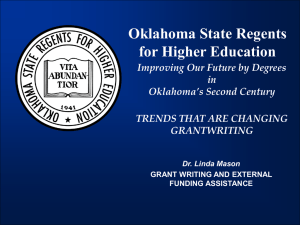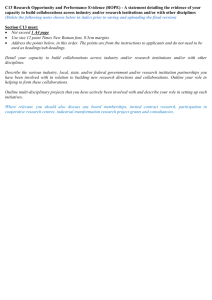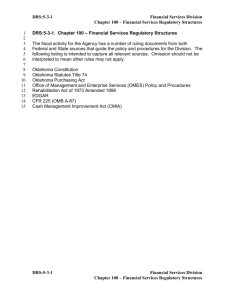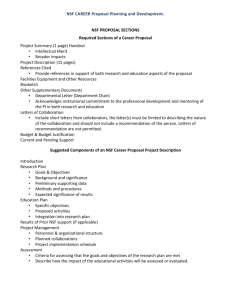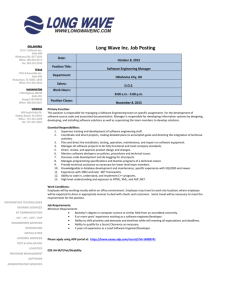Trends That Are Changing Grantwriting
advertisement
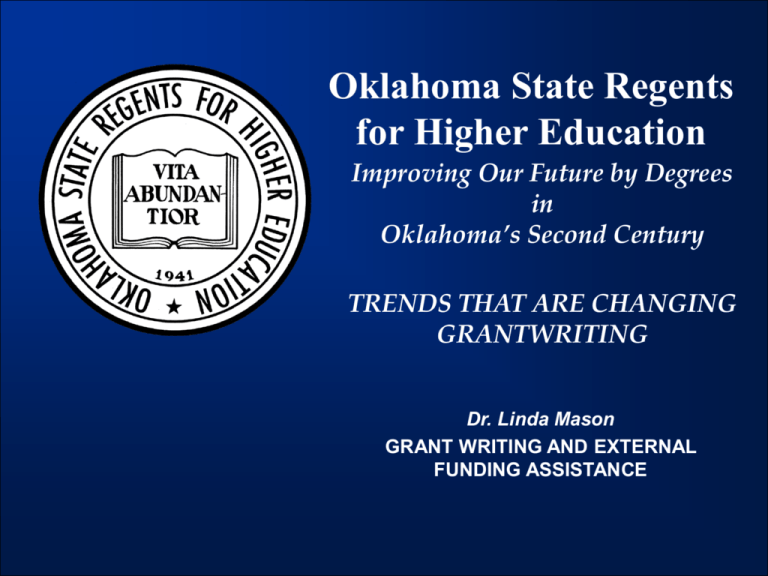
Oklahoma State Regents for Higher Education Improving Our Future by Degrees in Oklahoma’s Second Century TRENDS THAT ARE CHANGING GRANTWRITING Dr. Linda Mason GRANT WRITING AND EXTERNAL FUNDING ASSISTANCE The world of grants is emerging and changing rapidly! In 1850, it was considered totally inappropriate for government to fund research! In 1950, the NSF was very new, a new concept. PROFESSION Trend 1 Grantwriting has Become a Distinct Profession PROFESSION One Indicator is Professional Associations • NCURA (National Council for University • • Research Administration) SRA (Society for Research Administration, International) NORDP (National Organization of Research Development Professionals) • AAGP (American Association of Grant Professionals) PROFESSION • Certification programs – CRA (Certified Research Administrator) • Courses offered within degrees – Google: Where can I take a grant writing course? got 6,490,000 hits!!! • Nonprofit management degree programs – OCU MS in Nonprofit Management and Leadership, TCC – AA in Community Services – Google: Degrees in nonprofit management (6-15-10) got 2,555,000 hits!!!! • Research administration degree programs - Google: Degrees in research administration (6-15-11) got 17,700,000 hits! • Local and national grant trainers • Grant funding training organizations (Google: 21,300,000) • Careers Children today may grow up to become grantwriters and research administrators. OPPORTUNISTS Trend 2 Opportunists Have Emerged OPPORTUNISTS • Hucksters – television and newspaper ads: books, seminars, dvd’s on how to get “free government money” • Google search reveals many advertisers! • Vendors writing grants for repeat submissions COMPETITION Trend 3 More Competition for Funds COMPETITION • More nonprofit organizations – 1992 – 516,554 public charities 2007 – 1,209,500 …. 200+% increase • Privatization • “Friends” groups COMPETITION • NSF proposal funding rate in 2001 was 31%; 2009 was 32% because of ARRA funding, and 2010 was 23% (because of the increased number of proposals). • 74% increase in # of proposals submitted between 2001 & 2010!! COMPETITION • As the population increases, needs increase. • As social services decrease, private funding increases. • As the proposals increase, the competition increases. BETTER WRITING Trend 4 Better Proposals BETTER WRITING • Partly result of increased competition • Partly result of professional improvements • Partly result of increased giving • Funders focusing on measurable results for their $ BETTER WRITING 10 Years NSF Funding Increase • 1999 Oklahoma $17,309,000 • 2009 Oklahoma $46,760,000 INTERNET INFLUENCE Trend 5 Internet INTERNET INFLUENCE • HUGE impact! Everyone has access to everything! INTERNET INFLUENCE • Information online: • The Foundation Center • Catalog of Domestic Assistance • Grants.gov, • agency and foundation websites • listserves • electronic newsletters • Internet replacing libraries and the “go to” practice INTERNET INFLUENCE • Email and uploading replacing mailing and “send” mentality – RFP’s, proposals, information about the agency, recruitment, matching interests and opportunities • Internet training – webcasts, podcasts, videoconferences • Writing on computers – cutting and pasting INTERNET INFLUENCE • Dissemination: - Email and uploading replacing mailings, recruitment, marketing, educating, sharing, cloud computing • Internet dissemination: - webcasts, podcasts, videoconferences, twitter tweets, social networks RESOURCES INCREASING Trend 6 Grant Resources Growing RESOURCES INCREASING Charitable giving is now at an all-time high. In 2007, donations to America's charities topped $300 billion for the first time. Foundation giving is at an all time high. RESOURCES INCREASING Federal Agencies have increased R&D over the last decade, in spite of the economy. Academic R&D funding was cut less than 1% from 2010 to 2011. Basic research generally has broad, bi-partisan support. R&D funding has a 6.5% increase in the 2012 budget. Resource: AAAS, www.aaas.org/spp/rd, June 2011. RESOURCES INCREASING Oklahoma has dramatically increased R&D over the past 5 years: OCAST, EDGE, State Agencies, Oklahoma based Over $350 million in contributions for endowed chairs in Oklahoma higher education 2008 to 2010. FOUNDATIONS Trend 7 Foundations are Growing FOUNDATIONS • Fastest growing changes in giving of any private source. • Between 1975 and 2005, foundation giving increased by 475%, corporate giving by 185% • Market increases – assets growing • 2003 Foundations $476 billion • 2005 Federal Government Grants $440 billion FOUNDATIONS • Even with the largest economic crisis since the Great Depression, the 2010 foundation giving stayed flat, and shows a modest increase in 2011. • It is expected that 2012 giving will increase 4%. Resource: The Foundation Center, http://foundationcenter.org/ , April 2011. COLLABORATIONS Trend 8 Collaborations are the Norm COLLABORATIONS • Funding agencies know that partnerships create broader impact and provide multiple resource and skill sets • Grant seekers know each other and work to achieve the same goal COLLABORATIONS Examples of Required Collaborations • • • • • Undergraduate students Partners in other universities Interdisciplinary fields Corporations & community agencies Degree pipelines: K-12 → cc → univ → grad → corporate & community • Technology dissemination – for public • NSF data management plan requirement COLLABORATIONS • Fewer than 25% of research grants are awarded to individual researchers. • Funders want to see a broad impact for their funds – more bang for the buck! • Funding agencies know that partnerships create broader impact and provide multiple resource and skill sets. • More funders want to participate with other funders---several sponsors for one large project. COLLABORATIONS • Large funders are partnering for more indepth research and projects Example: NSF has signed a Memorandum of Understanding with the Department of Defense that would allow researchers to apply for grants to study subjects that may be of interest to U.S. national security. – – – religious fundamentalism terrorism cultural change COLLABORATIONS • Grant seekers know each other and work to achieve the same goal. Example: K-20 Center at OU has multiple partners and funders - 500 OK Communities/School Systems - Microsoft - Bill and Melinda Gates Foundation - Temple University - Sam Noble Museum - NSF - Oklahoma Educational Technology Trust - Sasaki Institute - League of Professional Schools, U of GA OU – multiple programs - National School Reform Faculty, Bloomington Indiana - Secondary Schools Network, U of Amsterdam • COLLABORATIONS Funders support local, state and national initiatives. COLLABORATIONS Federal Initiative - to serve, to involve, Hispanics and Native Americans. Federal Initiative – to serve, to involve undergraduate students Federal Initiative – to serve, to involve K-12 students and teachers Federal Initiative – to graduate more students from college ACCOUNTABILITY Trend 9 Funders are demanding more accountability! ACCOUNTABILITY Funders demand evaluation plans in the proposals. • Most federal funding agencies • Foundations • Corporations See https://www.cfda.gov/?static=grants&s=generalinfo&mode=list&tabmode=list ACCOUNTABILITY Federal agencies evaluating the effect of federal grant-funded research: STAR METRICS: New Way to Measure the Impact of Federally Funded Research National Institutes of Health (NIH) National Science Foundation (NSF) White House Office of Science and Technology Policy (OSTP) See http://www.nsf.gov/news/news_summ.jsp?cntn_id=117042&WT.mc_id=USNSF_5 1&WT.mc_ev=click ACCOUNTABILITY • Federal agencies discussing qualifications standards for grant workforces. • NSF predicts 3-5 years for government-wide qualifications requirements. Federal Grants Management Handbook, www.Thompson.com, June 2010. ACCOUNTABILITY • Required training: Ethics and the Responsible Conduct of Research • NSF 2009 requirement • NIH 1990 requirement Federal Grants Management Handbook, www.Thompson.com, June 2010. ACCOUNTABILITY • IRB – Internal Review Board (1974) • IACUC – Institutional Animal Care and Use Committee (1966) Seehttp://www.fda.gov/scienceresearch/specialtopics/runningclinicaltrials/guidancesinfor mationsheetsandnotices/ucm113709.htm and http://www.iacuc.org/. FAITH BASED Trend 10 Faith-Based and Neighborhood Initiatives Continue See http://www.whitehouse.gov/administration/eop/ofbnp/offices/federal FAITH BASED Federal Faith-Based Initiatives – 12 Federal Centers for Faith-based and Community Initiatives Department of Labor (DOL) Center Department of Homeland Security (DHS) Center Department of Agriculture Department of Commerce Department of Education Department of Health and Human Services Housing and Urban Development Department of Justice Department of Veterans Affairs Small Business Administration Corporation for National and Community Service US Agency for International Development See http://www.whitehouse.gov/administration/eop/ofbnp/offices/federal • Resources for Faith-Based and Community Organizations For a compilation of resources for faith-based and community organizations, see http://transparency.cit.nih.gov/fbci/index.cfm. Advice of the President's Advisory Council on Faith-Based and Neighborhood Partnerships See http://www.whitehouse.gov/sites/default/files/microsites/ofbnp-council-finalreport.pdf State and City Faith-Based Initiatives - Today 30 states have their own faith-based and community initiatives. Additionally, more than 70 mayors of both parties have similar programs at the municipal level. See http://www.whitehouse.gov/administration/eop/ofbnp/offices/states Volunteers - Of the 60 million people who give their time to others, more than one-third do so through faith-based groups. Value volunteer time – federal rate for volunteers is $21.36/hour Oklahoma 2008 rate for volunteers was $17.05/hour Source: The Independent Sector, www.independentsector.org, June 2011. Mingling - Federal competitive awards are expanding the good work of both faith-based and community organizations across America and beyond. State offices for Faith-Based and Neighborhood Partnerships: Oklahoma Robin Jones Director, Oklahoma Office of Faith-based and Community Initiatives Phone: (405) 522-0606 Email: info@faithlinksok.org See http://www.whitehouse.gov/administration/eop/ofbnp/offices/states FAITH BASED Areas of Faith Based Strengths: Addiction Recovery Prisoner Re-entry At-Risk Youth Community Health Services Homelessness Global Health Disadvantaged Students Disasters Economic Development Hunger Veterans See http://www.whitehouse.gov/administration/eop/ofbnp/about TRENDS: So what? Why look at trends? Focus on your strengths - fit trends. Make your proposal a notch above the good. Make your proposal “hot” Use best practices Give more Contact: Linda Mason, Ed.D. 405-225-9486 lmason@osrhe.edu http://www.okhighered.org/grant-opps/ IP: 164.58.250.178 COORDINATOR FOR GRANT WRITING AND EXTERNAL FUNDING TECHNICAL ASSISTANCE
